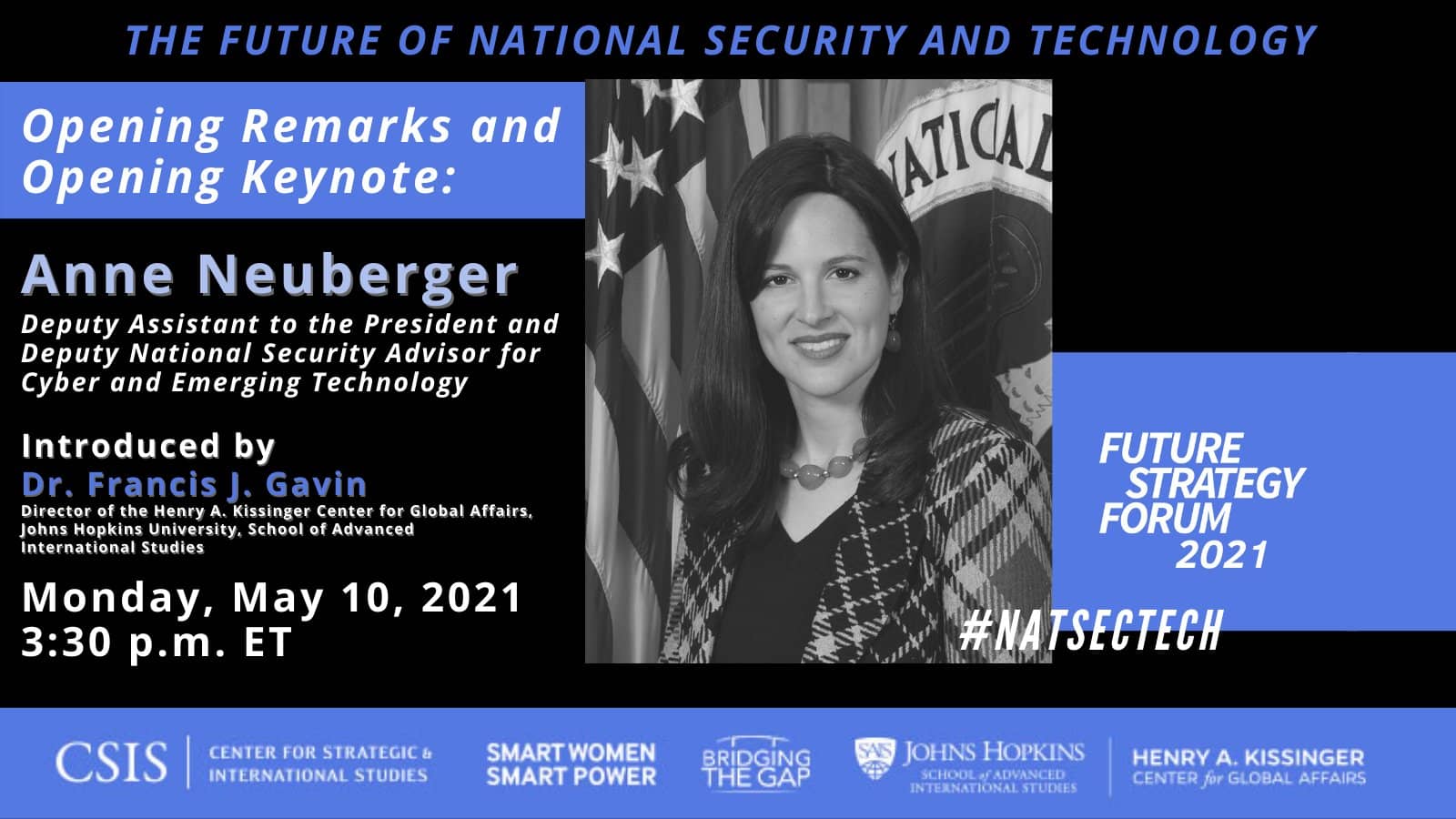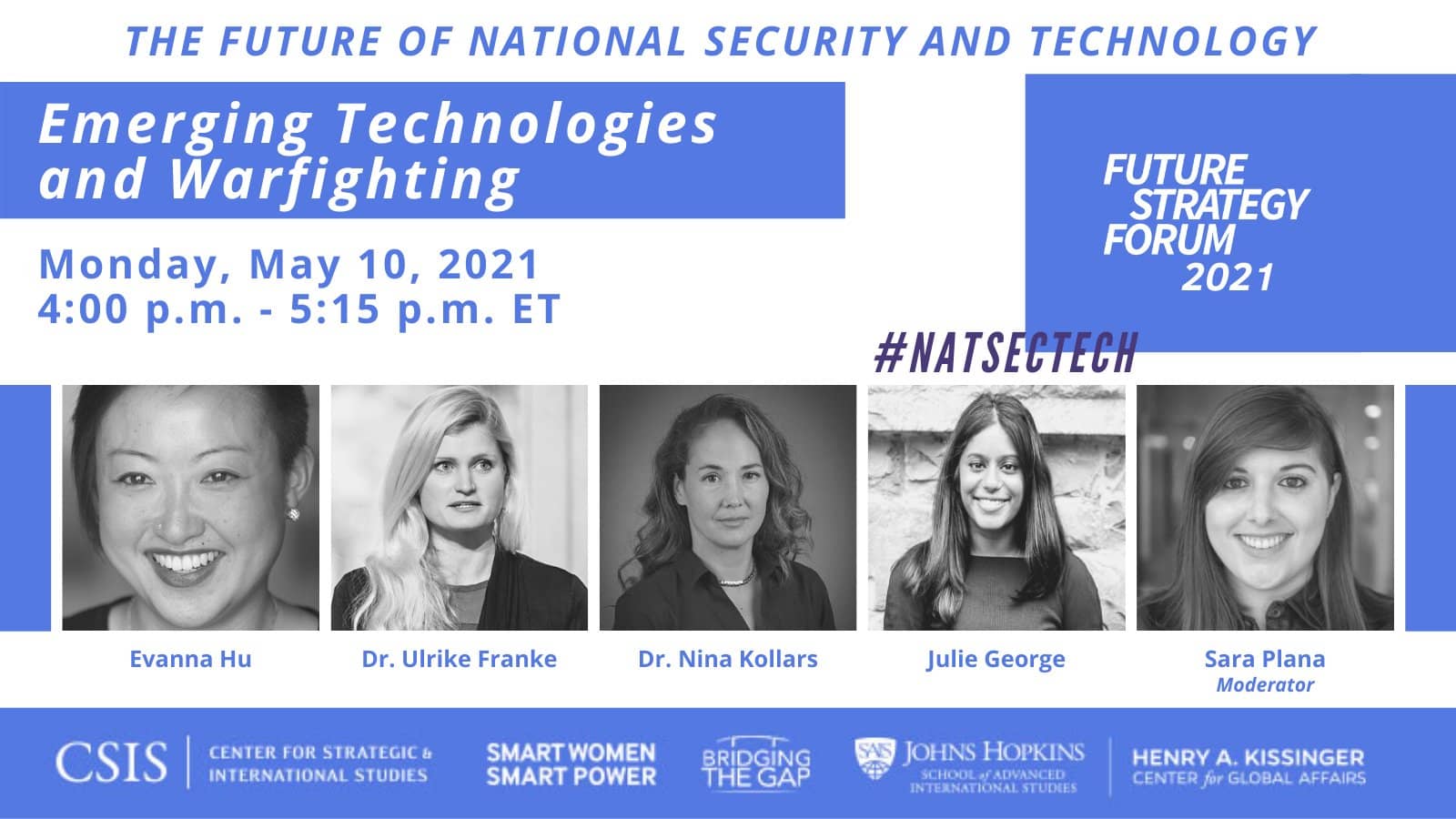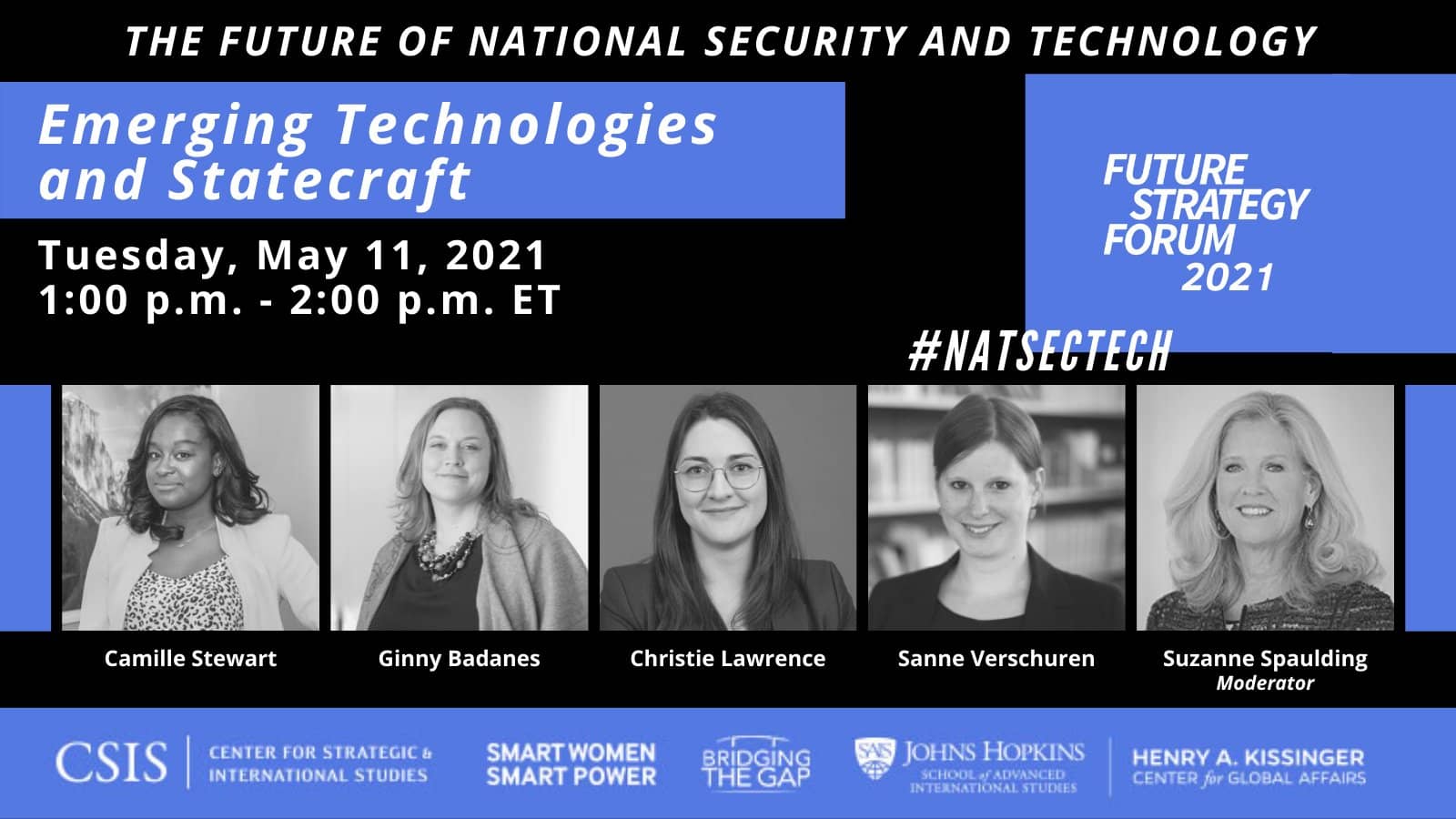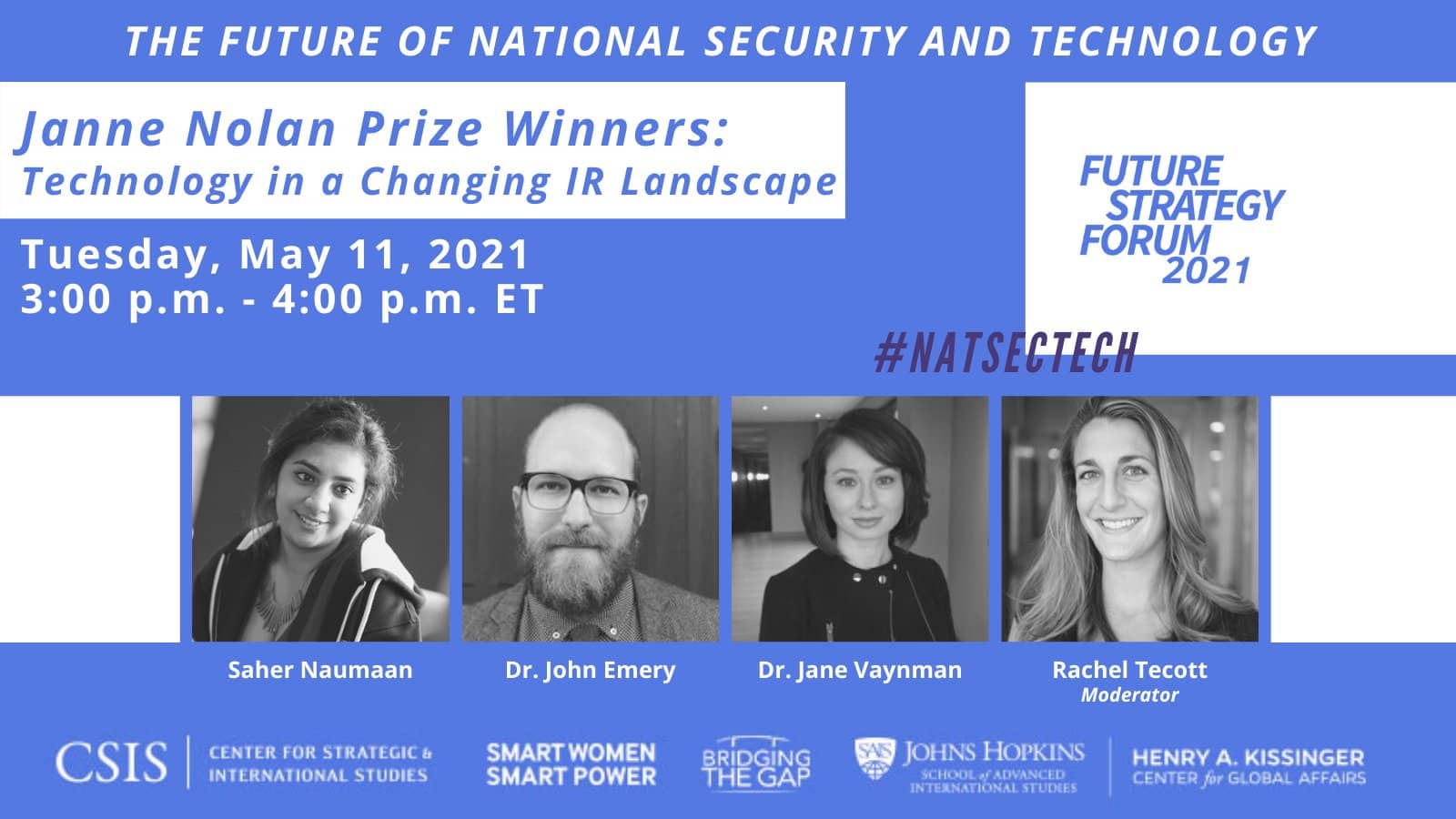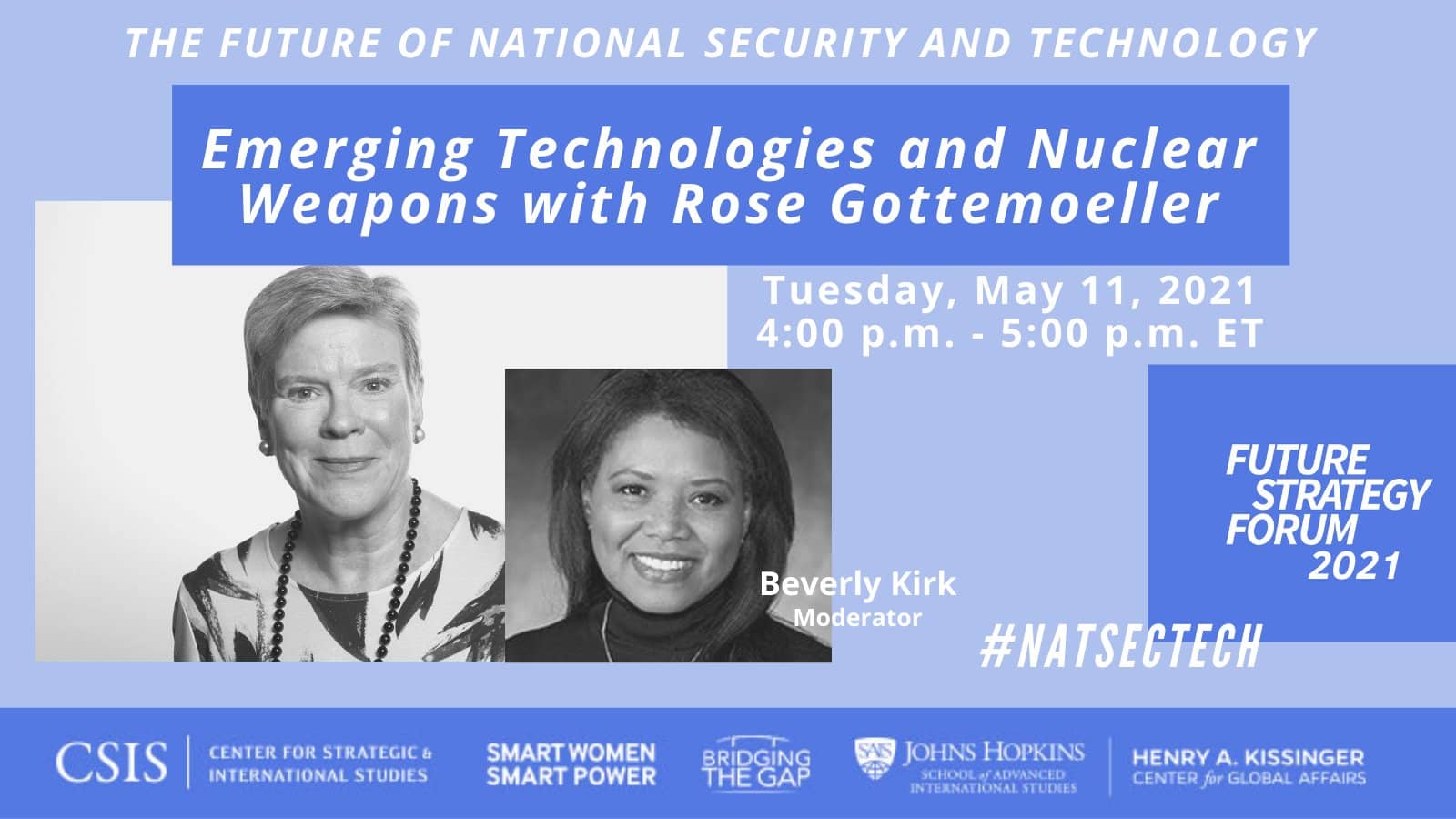2021 Future Strategy Forum
2021 Future Strategy Forum on the Future of National Security and Technology
The Henry A. Kissinger Center for Global Affairs at Johns Hopkins School of Advanced International Studies (SAIS) and the Center for Strategic and International Studies (CSIS) are pleased to have hosted the 2021 Future Strategy Forum, an initiative to connect scholars who research national security with its leading practitioners. With both the security and technology fields traditionally dominated by men, it is time to introduce and showcase female leadership in these fields. Our forum explores the implications for US national security, international security, and transnational conflict of technological developments in cyberspace, outer space, nuclear, unmanned systems, artificial intelligence and bio-engineering. Our experts—all of them women—address pressing questions and advance cooperative solutions to the challenges of emerging technologies and international security.
Learn More
Conference Agenda
Day Two
Learn More
Conference Agenda
Day One
Monday, May 10
Guest Keynote: Anne Neuberger
Deputy National Security Advisor, Cyber & Emerging Tech
National Security Council, The White House
3:30 PM EST
Introductory Remarks: Francis J. Gavin
Giovanni Agnelli Distinguished Professor and Director of the Henry A. Kissinger Center for Global Affairs
Johns Hopkins SAIS
Panel 1: Emerging Technologies and Warfighting
4:00 PM EST
The panel considered the ways in which emerging technologies are shaping the battlespace and changing the nature of warfare. What are the most important emerging technologies for warfighting? What impact will emerging technologies have on the traditional domains of conflict (e.g. air, sea, and land) and on emerging ones (e.g. space and cyberspace)? Do the benefits and costs of these technologies accrue differently to state and non-state actors, or across political systems? This panel assesses how prepared the U.S. military is to acquire, integrate, and adapt these technologies into warfighting, and how prepared competitors such as China and Russia are able to do the same.
The panel considered the ways in which emerging technologies are shaping the battlespace and changing the nature of warfare. What are the most important emerging technologies for warfighting? What impact will emerging technologies have on the traditional domains of conflict (e.g. air, sea, and land) and on emerging ones (e.g. space and cyberspace)? Do the benefits and costs of these technologies accrue differently to state and non-state actors, or across political systems? This panel assesses how prepared the U.S. military is to acquire, integrate, and adapt these technologies into warfighting, and how prepared competitors such as China and Russia are able to do the same.
- Ulrike Franke, Senior Policy Fellow, European Council on Foreign Relations
- Julie George, PhD Candidate, Cornell University
- Evanna Hu, CEO and Partner, Omelas
- Nina Kollars, Associate Professor, U.S. Naval War College
- Sara Plana (moderator), PhD Candidate, MIT
Day Two
Tuesday, May 11
Panel 2: Emerging Technologies and Statecraft
1:00 PM EST
This panel considers the ways in which emerging technologies are shaping interstate interactions across the spectrum short of kinetic action, from statecraft and diplomacy to information operations, and more. Which elements of emerging technologies are driving cooperative behaviors, and which are driving competitive behaviors? Are emerging technologies increasing the risks of misperception and miscalculation or contributing to deterrence? How successful have efforts been to establish laws or norms governing the use of emerging technologies? Does the emergence of these technologies suggest a need to restructure the national security apparatus and the responsibilities assigned to different bureaucracies? How does emerging technology impact the relationship between states and non-state actors, like private sector companies?
This panel considers the ways in which emerging technologies are shaping interstate interactions across the spectrum short of kinetic action, from statecraft and diplomacy to information operations, and more. Which elements of emerging technologies are driving cooperative behaviors, and which are driving competitive behaviors? Are emerging technologies increasing the risks of misperception and miscalculation or contributing to deterrence? How successful have efforts been to establish laws or norms governing the use of emerging technologies? Does the emergence of these technologies suggest a need to restructure the national security apparatus and the responsibilities assigned to different bureaucracies? How does emerging technology impact the relationship between states and non-state actors, like private sector companies?
- Ginny Badanes, Director of Strategic Projects, Cybersecurity and Democracy, Microsoft
- Christie Lawrence, Director, Research and Analysis, National Commission on Artificial Intelligence
- Suzanne Spaulding (moderator), Senior Advisor, Homeland Security, International Security Program
- Camille Stewart, Head of Security Policy - Google Play & Android, Google
- Sanne Verschuren, PhD Candidate, Brown University
Panel 3: Janne Nolan Prize Winners: Discussion of Emerging Technology and National Security
3:00 PM EST
In 2020, as part of the Future Strategy Forum, the Henry A. Kissinger Center for Global Affairs, in cooperation with CSIS and the Texas National Security Review, offered prizes to the best new scholarship from early career scholars in national and international security. Winners of the Janne Nolan Prize competition, Dr. Jane Vaynman, Dr. John Emery and Ms. Saher Naumaan speak on their winning essays to be published this summer in a special edition of the Texas National Security Review. Their articles focus on the implications of emerging technology on arms control, the origins of political-military wargaming and issues around surveillance, security and privacy. This panel will also illuminate other technology-driven challenges in national security.
- John Emery, Stanton Nuclear Security Fellow, Center for International Security and Cooperation, Stanford University
- Saher Naumaan, Principal Threat Intelligence Analyst, BAE Systems Applied Intelligence
- Rachel Tecott (moderator), PhD Candidate, MIT
- Jane Vaynman, Assistant Professor, Temple University
For more information on the Janne Nolan Prize click here.
Rose Gottemoeller served as the Deputy Secretary General of NATO from 2016 to 2019. Prior to this she served for nearly five years as the Under Secretary for Arms Controls and International Security at the U.S. Department of State, advising the Secretary of State on arms control, nonproliferation and political-military affairs. While Assistant Secretary of State for Arms Control, Verification and Compliance in 2009 and 2010, she was the chief U.S. negotiator of the New Strategic Arms Reduction Treaty (New START) with the Russian Federation. Presently, Ms. Gottemoeller is a Payne Distinguished Lecturer at the Center for International Security and Cooperation at the Freeman Spogli Institute, as well as a Research Fellow at the Hoover Institution. She discussed the future of emerging technologies and nuclear weapons in her address.
Day Three
Closing Keynote Address: Emerging Technologies and Nuclear Weapons with Rose Gottemoeller
Payne Distinguished Lecturer at the Center for International Security and Cooperation and Research Fellow at the Hoover Institution
Beverly Kirk (moderator), Fellow and Director for Outreach, International Security Program, and Director, Smart Women, Smart Power Initiative
4:00 PM EST
Rose Gottemoeller served as the Deputy Secretary General of NATO from 2016 to 2019. Prior to this she served for nearly five years as the Under Secretary for Arms Controls and International Security at the U.S. Department of State, advising the Secretary of State on arms control, nonproliferation and political-military affairs. While Assistant Secretary of State for Arms Control, Verification and Compliance in 2009 and 2010, she was the chief U.S. negotiator of the New Strategic Arms Reduction Treaty (New START) with the Russian Federation. Presently, Ms. Gottemoeller is a Payne Distinguished Lecturer at the Center for International Security and Cooperation at the Freeman Spogli Institute, as well as a Research Fellow at the Hoover Institution. She discussed the future of emerging technologies and nuclear weapons in her address.
Day Three
Wednesday, May 12
Virtual War Game with the Hoover Institution's Jacquelyn Schneider
1:00 PM EST
The war game explored the relationship between new technologies, domestic politics, conventional military capabilities, and nuclear threats. Players simulated decisionmaking roles in a national security cabinet and come to the war game as leaders in private industry, government, academia, and the military. The aim is to better understand the role that emerging technologies play in crisis decisionmaking and how Cold War paradigms of deterrence and crisis escalation apply in a world with new capabilities and vulnerabilities.
